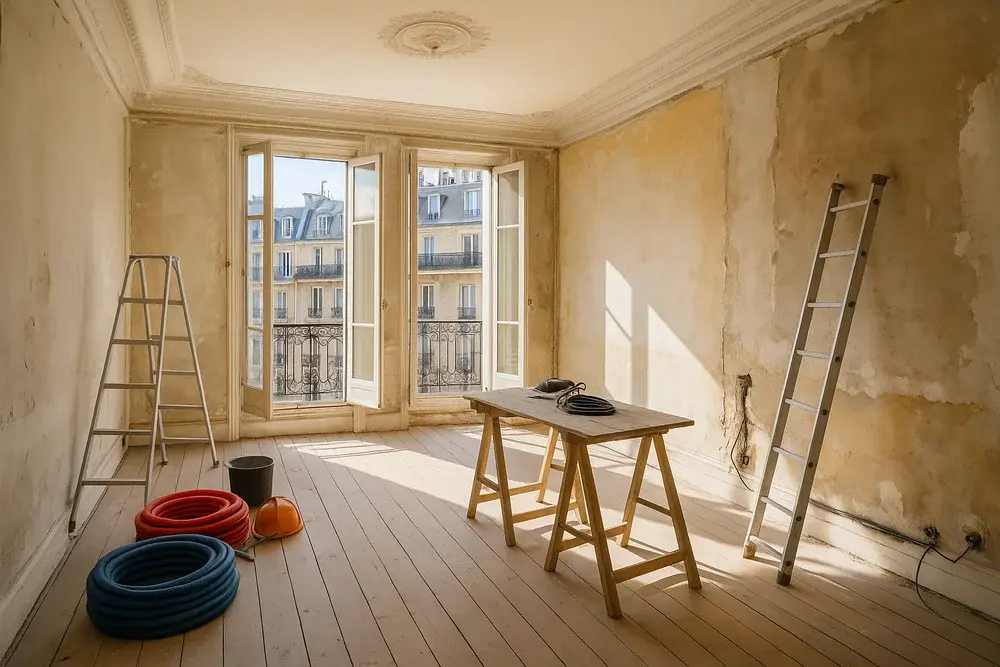When and how do I make a lower offer to buy?
In an ever-changing real estate market, making a lower offer is a balancing act between accuracy and strategy. Many buyers are keen to obtain a lower price, but this requires careful preparation and analysis. Several factors can influence the value of a property: its condition, its qualities, its defects, the seller's situation and the context of the sale. Let's take a look at how and when to make a lower offer to optimize your chances of success.

Understanding the fundamentals of real estate negotiation
Market dynamics and their impact on price
The real estate market is influenced by many external factors, such as supply and demand, interest rates and economic trends. In periods of high demand and high prices, negotiation margins are narrower. On the other hand, in a calmer market, with many properties available, sellers are more inclined to accept an offer below the asking price. First of all, find out about the state of the real estate market. Ask real estate agents when you visit properties. You can also ask your notary. You can also read the specialized press.
Some types of property are more resistant to the effects of a real estate crisis than others. In general, the prices of attractive apartments with no work carried out on them fall less than others during a crisis.
The importance of valuing the property for the right price
Before making an offer, you need to assess the price of the property you're interested in. This is no simple task. There are online tools, but let's face it, they're only approximate. They can be accurate, but they can also be far from reality. Given the large sums of money involved in a real estate transaction, approximation is not satisfactory. No sufficiently precise tool (such as the notaries' database) is available to private individuals. The only way for a private individual to estimate the value of an apartment or house is to call in a professional: a property hunter or a notary. It is not advisable to contact the real estate agent in charge of the sale: as judge and jury, he or she will not be able to give you an impartial opinion.
This valuation stage establishes a solid basis for a lower offer, and shows the seller that your proposal is based on concrete and justified elements.
Here again, if your sources come from your notary, they will carry much more weight than an opinion of value drawn from an online valuation tool.
How to determine a reasonable negotiation margin
In general, negotiation margins on the residential real estate market rarely exceed 5% during periods of rising prices. They can rise above 10% when the market is in decline.
What's your mindset? Get a price below the property's appraisal price? Get that appraisal price? Are you prepared to overpay for an apartment or house because you don't want to risk missing out?
The bigger the price reduction you ask for, the greater the risk that the property negotiation will be unsuccessful.
Identifying the right time to make a lower real estate offer

Impact of time on sale on negotiating power
The length of time a property has been on the market is a key indicator of its negotiating power. A property that remains unlisted for several months is a sure sign that the asking price is too high. A seller whose property has been on the market for a long time will generally be more inclined to accept a lower selling price.
Castorus is a tool that tracks the history of sales. However, it doesn't work on allreal estate websites. Here again, professionals have high-performance tools that are not available to private individuals. Our Parlez-moi de Paris real estate hunting agency offers its buyers the benefit of these tools.
The influence of seasons and economic conditions
The real estate market can vary, depending on the season and the economic situation. For example, spring is often an active period when many buyers are looking for a property, which can limit negotiation possibilities. Conversely, in autumn and winter, activity generally slows down, making sellers potentially more open to lower offers. However, the seasonal effect remains relatively weak. It will tend to accentuate the effects of a rising or falling market.
On the other hand, in periods of rising interest rates or economic uncertainty, the number of buyers decreases, and prices fall, which will increase negotiating power.
{{cta-vert-en}}
How to spot a seller who may be ready to negotiate?
Once you've seen an apartment or house, ask the real estate agent if the seller is open to negotiation. His or her answer may give you some indication of the seller's flexibility. And don't hesitate to ask how willing he is to lower his price.
Analyze the property's condition to support a reduced purchase offer
Evaluate building work

The general condition of the building can have a major impact on the negotiating margin. Major renovation work in a condominium, such as re-roofing, facade restoration or staircase renovation, can represent significant costs for the buyer.
To find out what work is pending in a condominium, it's a good idea to read the AGM minutes of recent years. You'll find out what work has been carried out and what is still to come.
By identifying and costing the work before making an offer, you'll have a solid argument to justify a price reduction.
Take into account any work needed on the apartment (plumbing, electricity, etc.)
When you are interested in an apartment, we advise you to visit it with an architect or contractor, so that he can assess the cost of the work. He or she will study the various items involved: painting, plumbing, electricity, storage space to be created, rooms to be moved, kitchen, bathroom, etc.
Secondly, check that the selling price of the apartment takes into account the cost of renovation. If this is not the case, a price reduction can be justified in view of the costs involved in bringing the apartment up to date.
Energy performance diagnosis (DPE)
The French Climate and Resilience Act prohibits the rental of apartments based on their DPE rating:
Reminder of the impact of the DPE on rentals
Climate Law: implications for landlords
Rent freeze in 2022
As of August 2022, the French Climate Law prohibits landlords from increasing the rent of properties rated F or G in the Diagnostic de Performance Énergétique (DPE), whether for lease renewals or new lettings.
If energy renovation work improves the property's DPE rating, these restrictions no longer apply.
Prohibition on renting out thermal wasteland
As of January 1, 2023, properties with an ECD rating of G+ (those exceeding 450 kWh/m²/year are rated G+) are no longer allowed to be rented out.
- 2025: rental ban for G-rated homes.
- 2028: rental ban for F and G-rated properties.
- 2034: rental ban for E, F and G-rated properties.
Using the DPE to make a lower property purchase offer
Between the prohibition on renting, the devaluation of the property in the years to come, and the cost of the work required to obtain a rating that will take the property out of the rental prohibition, even in the future, a poor DPE ratinghas a major impact on the value of properties. It's therefore a major lever for requesting a price reduction on the apartment or house you want to buy.
You can now estimate the cost of work required to improve your DPE rating using Beelly software. Don't hesitate to attach the report on the cost of the work, so that your request for a revision of the sale price has a greater impact.
Know the seller's situation to adapt your strategy

Study the seller's profile
To maximize your chances of success when negotiating, try to understand the context of the sale and the seller's motivations. Some sellers may be in a hurry to sell for personal reasons, such as a move, divorce or financial constraints. An urgent sale may lead sellers to lower their ambitions with regard to the sale price. Find out more about the seller's profile and situation, either directly or through your real estate agent, to help you refine your strategy. Here again, ask the real estate agent about the potential room for negotiation. It's not necessarily a question of following the agent's recommendations, but rather of gathering a range of information that will enlighten you about the possibility of making a lower purchase offer.
Detecting the seller's motivations for making a lower offer
A seller's motivations can also influence price flexibility. Some sellers are prepared to sell their property only if they can make a good real estate deal. They are looking to sell above the market price. With this type of seller, it will be difficult to obtain a fair negotiation.
{{cta-bordeaux-en}}
Estate sales, on the other hand, are generally sales in which the sellers are looking for a quick transaction. In this case, negotiations can be more important.
Stay informed and respectful
Understanding the seller's situation requires a certain finesse. Asking frank but polite questions can help you obtain important information without appearing indiscreet. The real estate agent, often well-informed, can be a valuable source for understanding the seller's expectations and knowing how far the negotiation can be taken. However, it is advisable to avoid excessive insistence or asking for information that is too personal. Staying within the bounds of courtesy will enable you to approach the real estate negotiation constructively, while increasing your chances of formulating an offer that takes into account the priorities of both parties.
Drawing up a solid, well-argued offer to purchase

Structure of a well-formulated real estate purchase offer
A solid real estate purchase offer is above all based on a clear and serious structure. In your written proposal, start by stating the basic information: details of the property (address, floor, surface area, brief description), the proposed price and the conditions of your offer (validity period, financing terms). A well-organized document, clearly setting out each point, gives an impression of seriousness and enables the seller to better understand your position. This kind of careful approach can increase your chances of the offer being taken into consideration.
Enclosing a financing plan from the bank or mortgage broker is not compulsory, but more than highly recommended. Some real estate agencies require it before making an offer to the seller.
Put forward justified arguments for the proposed price
To support a price below the asking price, we invite you to detail the reasons for your offer, based on concrete elements. Mention any work to be carried out, the characteristics of the location, a defect in the apartment or house, or current market conditions. By showing that your offer is based on objective facts, you can reassure the seller that your proposal is legitimate. A precise, well-founded argument is better perceived than a simple request for a discount. It can lead the salesperson to consider your offer more seriously.
On the other hand, an offer that details the reasons for a price reduction will help the real estate agent to defend your offer to sellers.
Use a respectful tone to preserve relationships
The way you formulate your offer is just as important as the content. A courteous and respectful tone is important for maintaining good relations with the seller. Remember that negotiation is often a multi-stage process.
Avoid abrupt or insistent language. Show that you respect the value of the property and the seller's expectations. Asympathetic offer is more likely to be accepted, even if it's lower than the price initially set. Respect and listening are key factors in successful real estate negotiations.
Mistakes to avoid when making an offer to buy a property at a reduced price

Underpricing without justification
One of the most common mistakes is to offer too low a price without providing valid reasons. An offer that is significantly lower than the asking price, without any well-founded argument, is likely to be perceived as unrealistic and aggressive. This can discourage the seller from continuing the discussion. To avoid this, justify every aspect of your proposal, based on factual elements as discussed earlier in the article. This approach shows the salesperson that your offer is well thought-out, motivated and not simply opportunistic.
{{cta-vert-en}}
Lack of transparency in the reasons for a reduced offer
In real estate negotiations, it's important to clearly explain your reasons for offering a lower price. Lacking transparency or avoiding detailing your motivations can lead to misunderstandings or mistrust on the part of the seller. By openly stating the criteria on which your offer is based, you reinforce confidence in your approach. A salesperson who clearly understands the motivations behind your proposal will be more inclined to respond favorably.
Avoid inappropriate comparisons with other properties
Comparing your property to others may seem relevant, but you need to be careful with this argument. Each property is unique. Differences in location, surface area or features can make a comparison inappropriate. So avoid using very different properties as references to justify your offer. If you wish to mention other properties, make sure that the characteristics are comparable and remain factual. Too rough a comparison could be seen as an attempt to influence the seller unjustifiably, which could damage the relationship.
When a low offer isn't a good idea

Situations where a low offer can jeopardize the transaction
In some cases, making an offer below the asking price can jeopardize the transaction. If the property is located in a highly sought-after area with few offers available, the seller is likely to receive several offers at the asking price, making a low offer inappropriate.
Scenario where it's better to align the offer with the asking price
In some cases, it may be more strategic to propose an offer at the asking price to avoid complications. For example, if the property corresponds perfectly to your criteria and you are unlikely to find a similar alternative.
To conclude on the keys to negotiating a lower price with confidence
Successful negotiation with a lower purchase offer relies on a balance between prudence and strategy. By taking into account the condition of the property, its financial requirements and local dynamics, you maximize your chances of making a suitable offer. This approach not only enables you to value the property at its fair price, but also to build a relationship of trust with the seller. Finally, if each step is carefully thought out and argued, your proposal has every chance of being received positively, facilitating a mutually beneficial transaction.




